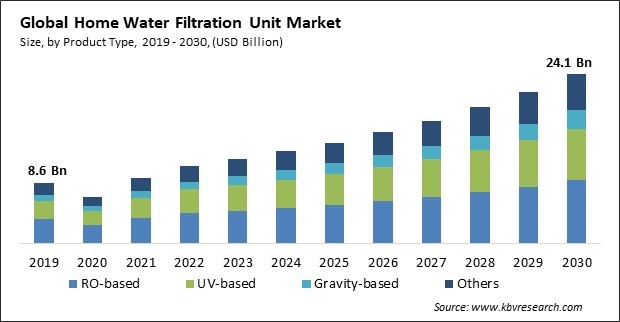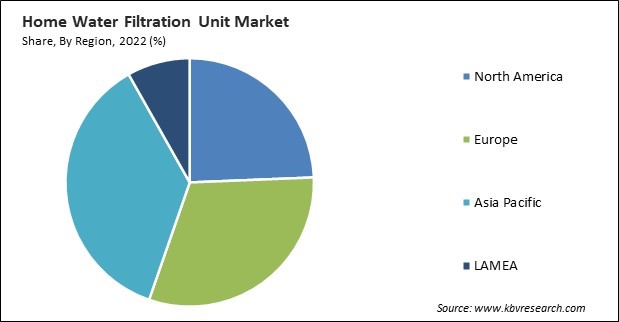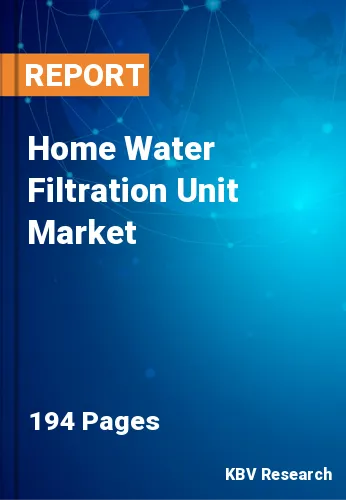The Global Home Water Filtration Unit Market size is expected to reach $24.1 billion by 2030, rising at a market growth of 10.5% CAGR during the forecast period. In the year 2022, the market attained a volume of 8,413.3 thousand units experiencing a growth of 8.9% (2019-2022).
Stringent regulations and standards set by European governments and regulatory bodies regarding water quality and safety can stimulate the adoption of these units. Compliance with these regulations often requires households to invest in effective water treatment solutions. Consequently, the European region would acquire nearly 30% of the total market share by 2030. Many urban areas in Europe have an aging water infrastructure, leading to concerns about tap water quality. As cities expand and populations increase, the strain on existing water systems may result in deteriorating water quality. Homeowners in urban settings are increasingly turning to water filtration units to address potential contaminants and ensure the safety of their drinking water. Therefore, the Europe segment will expand rapidly in the coming years. Some of the factors impacting the market are growing health and wellness trends, rising incidence of waterborne diseases and maintenance costs related to these units.

Concerns about contaminants such as chlorine, lead, pesticides, and other pollutants in tap water prompt individuals to take crucial steps to reduce their exposure. Water filtration units provide a practical means to remove or reduce these impurities, promoting a healthier drinking water source. Furthermore, clean and purified water is essential for maintaining proper hydration, a fundamental aspect of overall health. These units make it more convenient for individuals to access safe and palatable water, thus promoting regular hydration. Thus, these factors will increase demand in the market. Additionally, the awareness that waterborne diseases can be transmitted through contaminated water sources motivates individuals to take preventive measures. Home water filtration systems proactively mitigate or eliminate the potential hazards associated with waterborne illnesses by sanitizing the water ingested within one's residence. Furthermore, increased media coverage of water-related health issues and educational campaigns contribute to public awareness. Awareness of the necessity for filtration solutions is increased through disseminating information regarding water quality issues, waterborne disease outbreaks, and the significance of pure water. Owing to these factors, the market will expand rapidly in the coming years.
However, the need for periodic replacement of filters is a common aspect of home water filtration systems. Replacement filter costs may differ based on the filtration unit's brand and model. Consumers may be hesitant if they perceive filter replacement costs as an additional financial burden. Moreover, the ease or complexity of maintenance tasks can influence consumers' willingness to invest in a particular water filtration system. Systems requiring intricate filter replacement or servicing procedures may be less appealing to those seeking user-friendly solutions. These factors will reduce demand for these units in the coming years.
Based on product type, the market is segmented into RO-based, UV-based, gravity-based, and others. In 2022, the UV-based segment garnered a significant revenue share in the market. UV-based water filtration systems effectively disinfect water by targeting and inactivating microorganisms such as bacteria, viruses, and protozoa. The ability of UV light to disrupt the DNA of these pathogens ensures that they cannot reproduce and cause waterborne diseases. As consumers become increasingly aware of waterborne health risks, the demand for UV-based systems has grown. These factors will lead to increased demand in the segment.

By region, the market is segmented into North America, Europe, Asia Pacific, and LAMEA. The Asia Pacific segment procured the highest revenue share in the market in 2022. Rapid urbanization in many Asia Pacific cities has led to challenges in water infrastructure. Aging pipes, industrial discharges, and increased pollution levels can compromise tap water quality. In response, urban dwellers are turning to home water filtration solutions as a proactive measure to counteract these challenges and secure a reliable source of purified water. These factors will lead to increased demand in the segment.
| Report Attribute | Details |
|---|---|
| Market size value in 2022 | USD 11 Billion |
| Market size forecast in 2030 | USD 24.1 Billion |
| Base Year | 2022 |
| Historical Period | 2019 to 2021 |
| Forecast Period | 2023 to 2030 |
| Revenue Growth Rate | CAGR of 10.5% from 2023 to 2030 |
| Number of Pages | 194 |
| Number of Tables | 348 |
| Quantitative Data | Volume in Thousand Units, Revenue in USD Million, and CAGR from 2019 to 2030 |
| Report coverage | Market Trends, Revenue Estimation and Forecast, Segmentation Analysis, Regional and Country Breakdown, Porter’s 5 Forces Analysis, Company Profiling, Companies Strategic Developments, SWOT Analysis, Winning Imperatives |
| Segments covered | Product Type, Region |
| Country scope |
|
| Companies Included | Kent Ro System Ltd., SpringWell Water Filtration Systems, 3M Company, Panasonic Holdings Corporation, Amway Corporation, A. O. Smith Corporation, Crystal Quest Water Filters (Quest Technologies) and Veolia Environnement S.A. |
| Growth Drivers |
|
| Restraints |
|
Free Valuable Insights: Global Home Water Filtration Unit Market size to reach USD 24.1 Billion by 2030
The market research report covers the analysis of key stake holders of the market. Key companies profiled in the report include Kent Ro System Ltd., SpringWell Water Filtration Systems, 3M Company, Panasonic Holdings Corporation, Amway Corporation, A. O. Smith Corporation, Crystal Quest Water Filters (Quest Technologies) and Veolia Environnement S.A.
By Product Type (Volume, Thousand Units, USD Billion, 2019-2030)
By Geography (Volume, Thousand Units, USD Billion, 2019-2030)
The Market size is projected to reach USD 24.1 billion by 2030.
Rising incidence of waterborne diseases are driving the Market in coming years, however, Maintenance costs related to these units restraints the growth of the Market.
Kent Ro System Ltd., SpringWell Water Filtration Systems, 3M Company, Panasonic Holdings Corporation, Amway Corporation, A. O. Smith Corporation, Crystal Quest Water Filters (Quest Technologies) and Veolia Environnement S.A.
The expected CAGR of this Market is 10.5% from 2023 to 2030.
In the year 2022, the market attained a volume of 8,413.3 thousand units experiencing a growth of 8.9% (2019-2022).
The Asia Pacific region dominated the Market, by Region in 2022, and would continue to be a dominant market till 2030; thereby, achieving a market value of $9 Billion by 2030.
Our team of dedicated experts can provide you with attractive expansion opportunities for your business.

